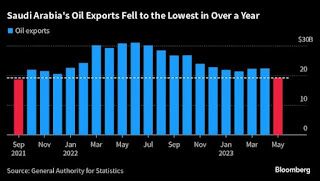Saudi Arabia, the world's largest oil exporter, experienced a significant decline in receipts from oil sales abroad during May, reaching the lowest levels since September 2021. This decline comes as energy markets struggle to recover, impacting the kingdom's oil exports and the non-oil sector. In this article, we delve into the reasons behind the decline in oil exports, the impact on the economy, and the government's strategies to navigate through the challenging global economic landscape.
Oil Exports Experience a Significant Drop
During May, Saudi Arabia's oil exports plummeted by more than a third, resulting in just over $19 billion in revenue. This sharp decline was evidenced in data from the General Authority for Statistics, which encompasses both crude and refined products. Moreover, the share of oil sales in the country's total exports fell to 74% from nearly 81% compared to the previous year.
Factors Influencing the Oil Market
In 2022, the kingdom enjoyed a windfall from higher crude prices and increased production. However, the situation changed in 2023 as Saudi Arabia decided to extend production cuts in an attempt to boost prices. These production cuts were implemented to regulate supply and address concerns over the global economy's stability.
Economic Impact of Crude Oil Prices
The fluctuations in crude oil prices played a crucial role in shaping Saudi Arabia's economy. In recent weeks, crude oil prices experienced some growth due to the impact of production cuts. However, there remained concerns that higher interest rates could dampen economic activity in the US and Europe, restraining further growth in oil prices. In May, Brent prices averaged around $75 per barrel, reaching $82.61 on Tuesday.
Non-Oil Sector Decline
While the oil sector is vital to the Saudi Arabian economy, Crown Prince Mohammed bin Salman's transformation plans have also focused on diversifying revenue streams away from oil. In May, exports from the non-oil sector declined by almost 9% year-on-year, amounting to 25 billion riyals ($6.7 billion). This decline raises questions about the progress of the diversification efforts and highlights the challenges of reducing dependency on oil revenues.
Government's Strategies to Navigate Economic Challenges
In response to the declining oil exports and challenges in the global economic landscape, the Saudi Arabian government has taken measures to mitigate the impact. The kingdom decided to prolong production cuts to control supply and stabilize oil prices. Additionally, Crown Prince Mohammed bin Salman's economic transformation plans continue to focus on developing the non-oil sector and attracting foreign investments to diversify the economy.
Conclusion:
Saudi Arabia's oil exports witnessed a significant decline amid a slow recovery in energy markets. The country's dependence on oil revenues remains a concern, emphasizing the need for continued efforts to diversify the economy. As the government navigates through challenging economic conditions, its strategies, including production cuts and economic transformation plans, will play a crucial role in shaping the kingdom's economic future. By addressing both short-term and long-term challenges, Saudi Arabia can build a more resilient and sustainable economy.




